It's an event that has come untethered in memory, ambled about, and plopped itself down in a place it doesn't belong. The incident has taken up residence in a much later time frame than it possibly could have happened. Based on my personal circumstances associated with the incident, it could not possibly have been earlier than late November, 1969, and based on the historical record it had to have been no later than mid-1970. It was shortly before a major holiday, so almost certainly had to have been December, 1969, yet the sulci on my brain stubbornly resist my attempts to herd it back into that pen.
Whenever the incident occurred, I remember it being one of those late fall or early winter central Illinois days when temperatures are pleasant enough during the day but drop precipitously when the sun goes down. I was dressed for "pleasant enough during the day"; it was now well past sunset and I was cold.
|
|
I was part of a group -- perhaps a dozen, perhaps less -- picketing at a grocery store in Champaign, Illinois, as part of a nationwide boycott of California-grown table grapes in support of the United Farm Workers. We were, according to the right, pissant little children of privilege playing at revolution. They were probably more right than wrong.
|
|

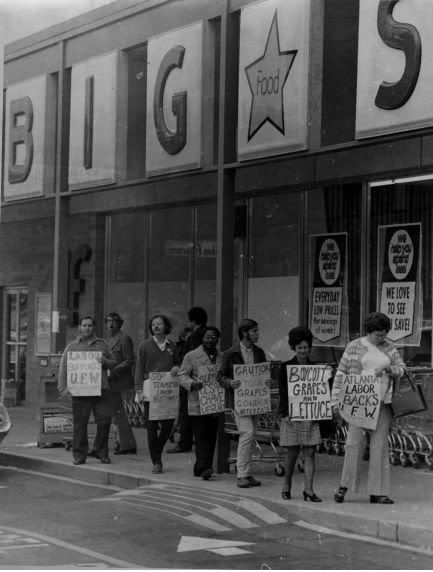
In 1965, a predominantly Filipino labor union, the AFL-CIO-affiliated Agricultural Workers Organizing Committee (AWOC), went on strike against grape growers in the Delano, California area, trying to force the growers to recognize their union for collective bargaining.
They shortly recruited the support of a competing union, the three-year-old National Farm Workers Association (NFWA) which was then representing largely Latino farm laborers. The following year, the two unions, still striking the growers, merged to form the United Farm Workers under the leadership of Cesar Chavez of the NFWA.
The ever-expanding strike was to drag on for five years, employing an escalating arsenal of tactics to draw attention and support for their cause. It was in support of that strike that I found myself among a group of college students staging an informational picket outside an Eisner supermarket in (maybe) December of 1969.

The picketing we were engaged in was an exercise in small victories. For every ten shoppers who brushed by us, avoiding eye contact, or with a sneer or an insult, refusing the literature we were proffering, there was the one housewife who took our leaflet. Maybe she just crumpled it into a ball and tossed it in the trash can inside the door; maybe she laid it in the cart and just left it there when she checked out; maybe she stuffed it in her purse and threw it out when she got home; but maybe one in ten read it as she shopped, and maybe of those one in ten decided she could live without grapes at her holiday gathering this year. Maybe one in ten of those who took the leaflet home stood over her trash can for a second and read it before throwing it away. Maybe one in ten of those decided it would only be a minor inconvenience to do without grapes the next time she went to the store.
Small victories. For every gang of fellow college students who took delight in buying a bag of grapes in the store and standing outside throwing them at us, along with hurling insults and taunts, we could console ourselves with the young mother who read our leaflet intently, turned around, and left. Maybe she just went down the street to another store, likely selling the same grapes. Maybe we were only a minor speed bump in her quest for grapes, a mere inconvenience, an annoyance, but we counted it a victory nonetheless.
Small victories. Get them where you can.
|
|

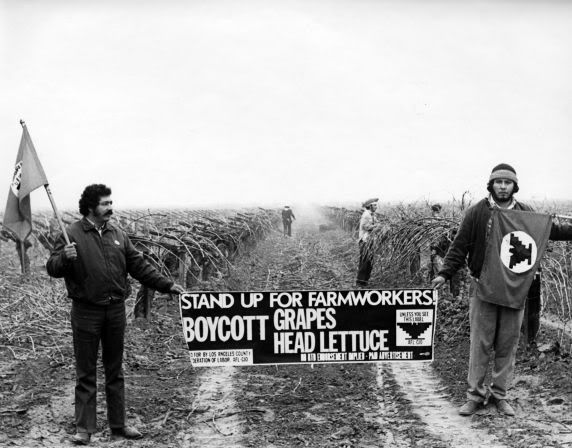
The strikes and accompanying boycotts, which initially targeted a succession of individual growers, led to tactics by the grape producers such as evading the boycott by selling their product under the labels of cooperating competitors who had already settled with, or had not yet been targeted by the union. The growers may have been opponents in the marketplace, but when it came to brown-skinned people organizing into unions, they were all on the same side.
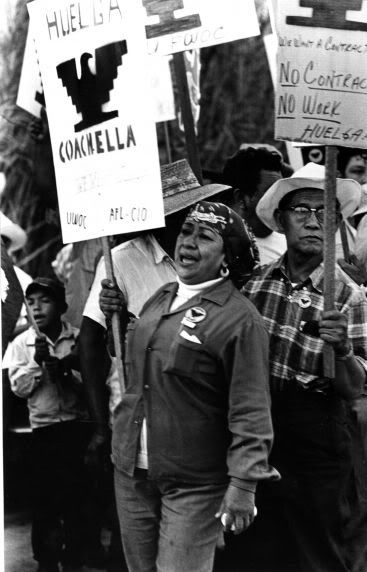
With no way to determine which labels of grapes were "safe" to buy any longer, the UFW expanded its boycott to all the growers, and by the time I became involved in it, we were picketing simply "California grapes". The persistence and dedication of the farm workers and their leaders inspired growing support across the nation. A month-long, health-threatening hunger strike by Cesar Chavez attracted national attention, and momentum continued to build.
By the middle of 1970 the pressure on the grape growers reached a critical mass and one by one they began to buckle, signing contracts recognizing the UFW. I'm not presumptuous enough to delude myself with the notion that a handful of kids passing out leaflets at a grocery store in the midwest had a damn thing to do with it, but very soon, the strike was over and the upstart migrant workers had won (however temporarily). In the context of the deplorable working conditions endured by the farm workers, it was a small victory, but a significant one. Now recognized as the official bargaining unit in the vineyards, it was time now to move on to other issues. One of those -- one with a long history that was already the subject of some intensive lobbying by farm laborer advocates -- was the hated short-handled hoe.

I don't remember how many pickets of grocery stores I actually took part in after that first one. My part-time job -- which I had started only shortly before that first picket -- soon kept me busy three or four evenings a week and weekends and prevented me from being as active as I wanted.
I always felt like a hypocrite, and with good reason -- my job that precluded my regular participation was with a competing grocery store that was probably selling the same grapes from the same producers. I always feared running into someone from my employer while picketing who would report me to the management and cost me my job. Or worse, a decision to picket the store where I worked! Talk about an untenable position.
It was a crappy part-time stock clerk / bag-boy job, but it was paying me a bit above minimum wage in a more liberal era and a single-breadwinner model when even minimum wage came very close to being a living wage. Bagging groceries would eventually pay for my college education. Losing that job would have been a major inconvenience. Fortunately, I was never found out. By either side.
|
|

Growers look at human beings as implements. But if they had any consideration for the torture that people go through, they would give up the short-handled hoe.

El Cortito, “the short one”. El brazo del diablo, "the devil s arm". The growers of the California fields couldn't do without it -- though ironically, the agricultural community in 48 other states never found sufficient reason to utilize it.
The employers insisted it was a matter of control and accuracy. Unless the worker got down close to the ground, too many plants would be damaged weeding and cultivating the fields. But hour upon hour, day upon day, month upon month, year upon year of bent-over labor was brutal, leaving workers crippled well before they reached retirement age (not that there was much of anything that could be called a retirement program for farm workers).
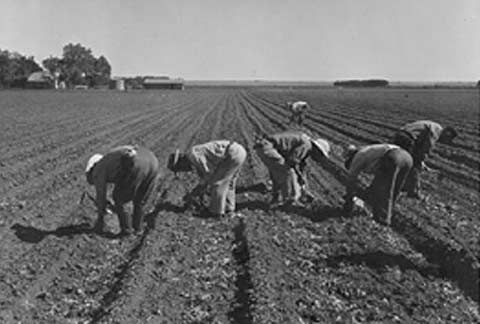
Migrant workers who toiled in the sugar beet and lettuce fields were forced to use a special tool. It was a short-handled hoe that they called El Cortito, "the short one." This special hoe had a handle that was only 12 or 18 inches (30.5 or 45.7 centimeters) long. A regular hoe has a long handle that allows a person to stand up while using it. El Cortito, however, forced workers to stay in the bent-over position, twisting their bodies to crawl along rows of lettuce or beets. After 10 or 12 hours of holding this position, many people were unable to stand straight. Because the children's bones were still forming, using El Cortito was especially harmful for them. It often resulted in horribly painful backaches for the rest of their lives. Even though the long-handled hoe could be used, the growers insisted that workers use El Cortito. Th growers believed that the short-handled tool caused less damage to the growing vegetables.
Barbara J. Davis, The National Grape Boycott: A Victory for Farmworkers
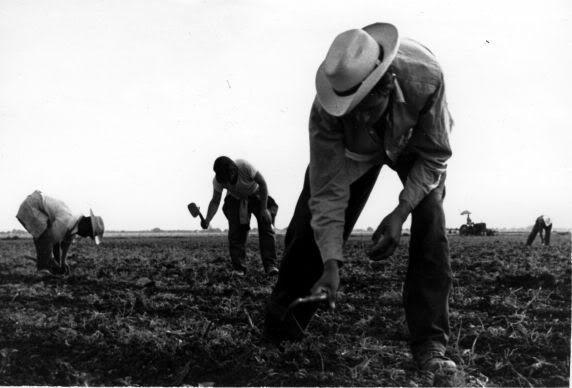
Since the late nineteenth century, the owners of the fields of California had relied on cheap, temporary migrant labor to plant, tend, and harvest their produce. They had no investment in the long-term health of their workers; if one was no longer able work, there were plenty of others to take his or her place. They were immanently disposable. From the very beginning, the short-handled hoe was a tool of choice -- not of the workers, but of the owners.
The workers forced to use the short-handled hoe suspected that the only issue of control in the politics of the short hoe was control of them. El Cortito made the job easy for the field bosses. Anyone standing was not working.
As early as the 1920s farm workers were engaging in isolated protests and work stoppages over the use of the short-handled hoe. During the Depression, though, the poor people from Oklahoma, Arkansas, and elsewhere who flocked to California were willing to do any work, including using the short-handled hoe, for lower wages. Hence the protests of the 1920s were rendered ineffective.
Douglas Murray, "The Abolition of the Short-Handled Hoe"
Hispanics, a staple of the California fields since irrigation turned the arid land into productive farm ground, and beginning to organize in opposition to oppressive working conditions including use of the short hoe, suddenly found themselves persona non-grata as desperate white Americans flooded the fields and orchards. The Mexican Repatriation during the Great Depression forced as many as a million Hispanics out of the United States, some 60% of them legal U.S. citizens. There were plenty of Okie refugees streaming in from the Dust Bowl willing to work cheaper, and too desperate to complain about working conditions. The growers were no longer dependent on Hispanics. It would take a world war before they were welcomed back into the fields.

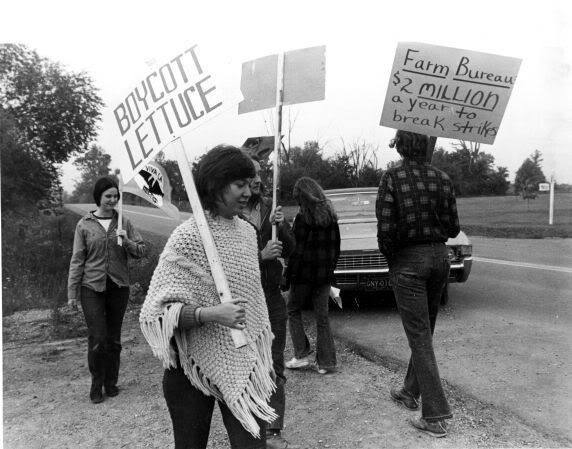
Even immediately after college, in another town, in the dreadful Nixon wage-price-freeze economy leading into the mid-seventies, the grocery industry provided me with what we would call today a "McJob" that, as McJobs go, was a pretty good one, the only union gig of my life and one that, by the time I left three years later (in the middle of an aggressive union-busting campaign), was paying an hourly rate that put my annual income squarely at the median household income for that year. The federal minimum wage would not surpass my last hourly rate in the unionized grocery industry until nearly 30 years later.
All I had to do for those sweet wages was stock shelves, bag groceries, and, once or twice a week, help out in the produce department re-packaging the contents of cartons of Bud Antle lettuce into cellophane bags for resale.
Souls sold cheap here.
|
|

Section 5 Duties
(a) Each employer --
(1) shall furnish to each of his employees employment and a place of employment which are free from recognized hazards that are causing or are likely to cause death or serious physical harm to his employees;
General Duty Clause, Occupational Safety and Health Act of 1970
The struggle against the grape growers had been an exercise in small and, as it turned out, tenuous and often fleeting victories. The damage done by the short hoe called for something sweeping, wide-ranging, and incontrovertible. The tactics of the grape strikes were insufficient to the demand. The power of the state needed to be invoked. The recently passed Occupational Safety and Health Act seemed to offer a perfect avenue to relieve the workers of the torture of the short hoe. The state, however, and its movie star governor, declined to become involved.
The labor organizers had, since the late sixties, been cultivating relationships with community assistance organizations for support. One of these was California Rural Legal Assistance (CRLA). An outgrowth of Lyndon Johnson's War on Poverty, the then-federally-funded CRLA was, in fact, already in the early stages of legal proceedings against the California education establishment on behalf of the migrant workers at the time the grape strikes ended in 1970.
The CRLA won a major victory in Diana vs The California State Board of Education , filed in 1970 and concluded in 1973. At the request of Hispanic laborers, the CRLA challenged the schools' practice of warehousing the children of migrant farmworkers -- more than 35,000 of them -- in special education classrooms on the basis of intelligence tests administered in English only. The state was forced to revamp its testing and teaching methods to accommodate the migrant children's language skills.
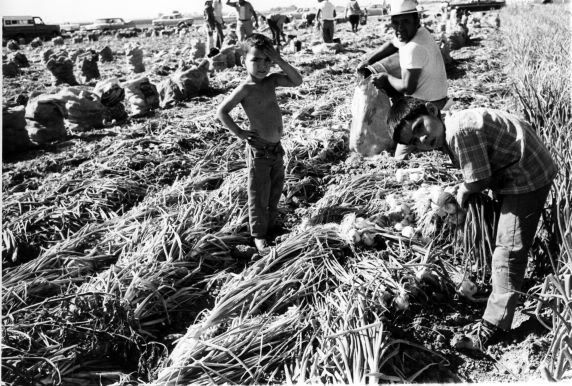
At the same time, the CRLA was building its case against the short hoe. They gathered mountains of medical evidence and testimony of medical professionals that long-term use of short-handled tools led to debilitating and permanent injuries. especially in children who toiled with their parents in the fields as their young bones were still forming. The CRLA collected evidence that the short hoe had never been used in 48 states, and oversaw a study that found long handled-tools to be more effective than the short tools.
The growers enlisted their own army of supporters, arguing that the tools were not the cause of the migrants' injuries, because they were just the inevitable result of farm labor in general, and recruited their own medical experts who argued that the Hispanics' bodies were simply genetically deficient and predisposed to such injuries.
The CRLA presented their evidence to the Industrial Safety Commission of the California Occupational Health and Safety Agency, arguing that the evidence clearly showed the short-handled tools constituted an "unsafe hand tool" under the statutes, and that alternatives existed that were not cost prohibitive. They had built a formidable case for the farm workers.
The Industrial Commission ruled that it did not have jurisdiction over "long term" injuries.
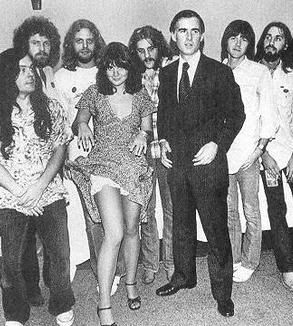
Governor Moonbeam and First Squeeze Linda Ronstadt
 |
In response, the CRLA filed suit against the state demanding that it enforce the rules against dangerous tools. In 1975, the California Supreme Court handed down
Carmona vs. Division of Industrial Safety, ruling that the Industrial Safety Commission did indeed have the authority to regulate short-handled tools and ordering the commission to reconsider its decision in the context of the court's ruling.
The case went back to the Industrial Commission, but it was a very different commission than the one that had initially ruled on the case. In the interim between the commission's initial ruling and the court-ordered reconsideration of the case there had been an election -- you know, those things with consequences. Governor Ronald Reagan had not sought re-election, opting to move on, his sights set on fucking up things much larger than mere states, and the new governor, Democrat Jerry Brown, had replaced the old Chesterfield pitchman in the governor's mansion. The Industrial Commission had undergone a facelift and was populated with a new group of commissioners, much more sympathetic to the plight of the farm workers. There was no foot-dragging this time. El Cortito was no more.

A weekend of gardening has taken its toll on my back. It's hell getting old. The doctor suspects the problem is arthritis, although he acknowledges there are a couple of other things it might be. He could do a few tests and find out for sure, he says, but at this point the treatment for all is the same -- take some over-the-counter pain relievers and quit whining.
And just about everyone has had quite enough of dsteffen's incessant whining. "He's cold," "His back hurts," "He might get fired."
Look, I'm a white, middle-class male. I could live a hundred years and I'll never know what it's like to be a Black man in a ghetto, or a Native American on a reservation, and while I've spent a few days in my lifetime -- certainly not much more than a couple of hundred -- baling hay, walking beans, building fence, shoveling manure, and all the other kinds of physical labor a typical farm boy of the 1950s and 60s ended up doing in the course of his youth, it comes nowhere close to giving me the least bit of insight into the life of a Hispanic migrant worker spending a lifetime laboring day in and day out in the fields.
All I can do is believe them -- and not their employers -- when it comes to the effects of working conditions in the fields. Which side are you on, boys?
|
|

In the 35 years since the banning of the short hoe, the incidence of back injuries among migrant farm workers has fallen by 34%. Despite the stunning improvement, unfortunately, the banning of the short hoe did not universally provide the relief the workers and their supporters had hoped. With the short hoe banned, many growers turned to hand weeding to avoid feared crop losses from what they perceived as the less-controlled long-handled tools. The farm workers and their allies dug in for another battle.
Almost 30 years after the short-handled hoe was outlawed, California became the first state to restrict hand weeding in 2004. The regulations still allow hand weeding if the grower can demonstrate a compelling need to protect delicate crops that can't be achieved with long-handled tools, but the regulation places restrictions on the length of time a worker can be required to engage in the practice, and mandates longer and more frequent breaks to help protect the workers' health.
But California is just one state -- others still permit the practice -- and even in California, enforcement is problematic. Unlike an outright ban, the practice can still be utilized, so observance of workers engaging in the practice is not necessarily evidence of a violation. And adherence to limits on hand weeding are as flexible as the employers' record-keeping allows. And violations are as widespread as the winners of the last election permit.
The United Farm Workers currently represent about 27,000 farm workers in California and nine other states. They have survived now for 45 years in the notoriously hard-to-organize agricultural community. As an old farm boy, I can rattle off a long list of white guys' farm unions that reside now only in the dust bin of history. According to
Fox News, the UFW has simultaneously shrunk to insignificance and at the same time represents the biggest threat to farm workers. They must be doing something right.
California Rural Legal Assistance was de-funded by the federal government in 1996 -- is there really any need for me to spell out the historical context for that turn of events? -- but the organization has managed to survive on other sources of funding. They have undergone an ongoing series of federal investigations into their operation and fundraising initiated under the Bush administration. Elections have consequences.

I don't know what became of most of the people I picketed with back in those days. Hell, I remember hardly any of their names. Most, presumably, went on to live productive lives with varying degrees of involvement in progressive causes. A few may even have become conservatives, who knows? I suppose many of us probably "sold out" (at least through periodic non-involvement) to one extent or another. Life takes people on strange journeys, but we were mostly college-educated white kids. Few or us probably suffered much beyond a few inconveniences.
One of our leaders in those pickets later transferred to Berkley. I read some time later -- one of those "where are they now?" pieces in the campus newspaper that happened to appear on a day when I drove over to visit a friend who was still in grad school -- that he married an Hispanic woman and was involved at that time in migrant farm labor issues. The Google Machine says he is now an attorney in California, specializing in personal injury and workers' compensation law. I wonder if he ever litigated claims resulting from the short hoe.
I'd like to think so.
|
|

And that, dear Kossacks, is where regulation comes from -- not from bored bureaucrats sitting in an office in Washington trying to think up ways to make life miserable and expensive for some innocent and unsuspecting businessman, but from real human suffering and tragedy brought about, all too often, by people who shirk what should be obvious responsibilities, who neglect basic diligence, who sacrifice safety for profit. They bring suffering on those who trust them and their products, and society adopts measures to make sure it never happens again. We have to force them, through regulation, to behave as they should have been behaving all along. That's how regulation came to be.



Previous installments of How Regulation came to be:

Most images of farm workers and strikers in this diary are from the Walter P. Reuther Library at Wayne State University.


